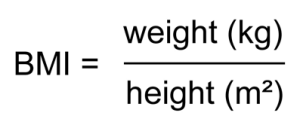We are all aware of the risks associated with obesity and excess fat, however most don’t realize that being underweight is also a health concern. Many of us may secretly wish we were more likely to fall into the underweight category rather than the overweight, but regardless of which direction you fall, anything outside of a healthy weight range has the potential to harm your health. It’s just as important to take care of your diet whether you are underweight, overweight, or in a healthy weight category.
How Do You Know If You’re Underweight?
Because every body is different, there is no single calculation that can quickly determine your overall weight-related health. For example, the Body Mass Index (BMI) does not take muscle mass into consideration when attempting to categorize you into a weight group. However, it is a good start to gather a general idea of your overall body weight health. As always, be sure to discuss your weight and health with your doctor. To determine your Body Mass Index, you can use the following calculation:

For adults, a BMI below 18.5 is considered to be underweight and a BMI higher than 25 is considered to be overweight. Studies show that underweight premenopausal women are at higher risk for low bone mass and low skeletal muscle.1 In addition, women with a very low body fat percentage (less than 15%-17%) may develop secondary amenorrhea or loss of a menstrual cycle.2 This is also likely in women who have lost a large amount of weight in a short amount of time. Regardless of gender, perhaps the biggest risk of being underweight is malnutrition. Malnutrition occurs when the body does not receive the nutrients it needs to properly function. Specific nutrient deficiencies can lead to specific disease states such as Beriberi (thiamine deficiency) or Kwashiorkor (protein deficiency). For individuals who fall into the underweight category, there are numerous ways to stay healthy while increasing weight.
Focus on protein consumption
Protein contains the amino acids needed to build lean muscle. If gaining weight is your goal, you are probably concerned about the type of weight you are going to gain. Protein is needed in the body to make cells, repair cells, and is essential for proper growth. Amino acids can be divided into three groups: essential, nonessential, and conditional.3 Essential amino acids cannot be manufactured in the body and must be consumed. It is important to eat a balanced diet for this reason. You should consume 0.8 grams of protein per kilogram of body weight as a general rule of thumb. For example, a 170-pound man should consume a minimum of 62 grams of protein per day.
Increase caloric intake slowly
Unless otherwise advised by your doctor, take your time to gain weight healthily. Start by increasing your caloric intake 100-200 calories per day. You should never gain or lose weight rapidly. A healthy weight loss happens over a long period of time, losing between 1-2 pounds per week. Just as weight loss should happen slowly, pace yourself to gain weight slowly in the same fashion. Make your calories count by adding an extra nutrient-packed apple or avocado to your lunch.
Train with weights
Keep your body strong and lean by building muscle. Muscle weight has a toned appearance and improves metabolism. Another reason to build muscle is to build strong bones. An article published by Harvard Health states, “Most of us know that strength training (with free weights, weight machines, or resistance bands) can help build and maintain muscle mass and strength. What many of us don’t know is that strong muscles lead to strong bones. And strong bones can help minimize the risk of fracture due to osteoporosis.”4 Try to incorporate strength training into your workout routine three times per week.
Take a multivitamin
Ward off malnutrition by filling dietary gaps. If you aren’t consuming a well-rounded diet, take a high-quality supplement that is third-partytested and avoids fillers. Look for active ingredients like cholecalciferol (vitamin D), menaquinone-7 (vitamin K), riboflavin 5’-phosphate (vitamin B2), and methylated folate. As always, consume a well-balanced diet that includes a variety of fruits and vegetables to obtain all of the needed nutrients. The key to a healthy weight is a healthy diet.
Try our Foundational Multivitamin
Provides 19 essential vitamins and minerals plus antioxidant support to promote overall health and wellbeing.*


